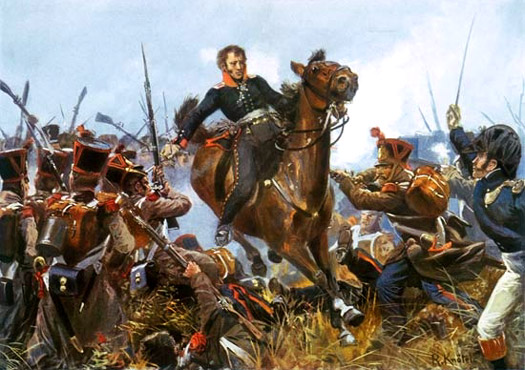News & Events
Symposium and rare works concert present life under Napoleon’s rule
Moores School of Music professor Jeffrey Sposato recovered musical texts to be performed in Houston premiere of rarely heard music of Napoleonic era in Germany

French grenadiers of the line defend against an attack by Prussian infantry in the
three-day Battle of Leipzig in October 1813, dubbed the 'Battle of the Nations'
due to the number of states involved, in this 1914 painting by Richard Knöte
To commemorate the 200th anniversary of Napoleon’s penultimate defeat, a collaborative of College of Liberal Arts and Social Sciences musicians, historians and linguists will host the “Napoleon and the Battle of Nations” interdisciplinary symposium and concert Nov. 21 – 23.
“We’re doing an historical recreation concert that includes music that hasn’t been heard in the United States before,” says Jeffrey Sposato, associate professor of musicology in the Moores School of Music. “We’re going to recreate the entire style of a concert from the early nineteenth century, which is very different from what we normally experience today.”
The Battle of Nations, also known as the Battle of Leipzig, marked the beginning of the end for Napoleon Bonaparte’s global conquest.
As Emperor of France, Napoleon controlled the city of Leipzig within the state of Saxony in Germany for seven years prior to this battle in 1813. During that time, the mood in the city shifted from optimism fueled by Napoleon’s promises of a better future to deep discontent as his wars of conquest raged on. Such emotions were reflected in the music performed in the city’s famed Gewandhaus concert hall.
The battle pitted Napoleon’s military, including troops from Poland, Italy and numerous German states, against a coalition of armies from Russia, Prussia, Austria and Sweden. More than 500,000 men engaged in combat during this massive fight.
In the end, Napoleon’s forces were soundly defeated on Oct. 18, 1813 in the largest battle of the Napoleonic Wars.
More than 90,000 people lost their lives in the Battle of Nations. It decimated Napoleon’s forces and caused him to withdraw back into France surrounded by Coalition troops. Seven months later, Napoleon unconditionally abdicated his throne.
The musical legacy of this era is rich, but in danger of being lost to modern audiences, said Dr. Sposato, the music historian for the three-day event.
“Many of the works and texts we’re using faded from public concerts and have not been heard in many decades,” he said.
Sposato assembled 19th-century editions of the concert’s music and one of his students transcribed one of Italian composer Ferdinando Paer’s opera quartet directly from an original manuscript. The concert and symposium are based on the research Sposato conducted for his forthcoming book, Leipzig After Bach: Church and Concert Life in a German City, 1750-1850.
The symposium starts at 4 p.m. on Thursday, November 21 in Dudley Recital Hall with an interdisciplinary panel discussion on the Battle of Nations. In addition to Dr. Sposato, the panelists are:
- Bailey Stone, professor in the Department of History and a scholar of French and European history
- Hildegard Glass, chair of the Department of Modern and Classical Languages and Director of German Studies
- Anselm Hartinger, a Leipzig historian and curator of the musical instrument collection at Landesmuseum Württemburg, the state historical museum in Stuttgart, Germany.
A short concert preview, featuring the UH Moores Concert Chorale, will follow the discussion. This event is free to the public. The preview is scheduled to begin in Dudley Recital Hall at 6 p.m.
The full concert is a ticketed event on Saturday, Nov. 23 in the Cullen Theater of the Wortham Center in downtown Houston, 500 Texas Avenue.
Performers include Mercury – the Orchestra Redefined under the direction of Antoine Plante and the award winning UH Moores Concert Chorale under the direction of Betsy Cook Weber.
Mercury musicians will perform with replicas of instruments used during the late 18th century and early 19th century era. The works are separated into two themes:
- Part I - “Celebrating Napoleon and the New Kingdom”
Beethoven’s “Coriolan Overture,” Hasse’s “Te Deum in D Major,” an excerpt from Paer’s opera “Leonora,” Mozart’s “Diving Being, to You Be Praise and Honor”
- Part II - “Leipzig at War”
Excerpts from Haydn’s “Mass in Time of War,” Weber’s “The Lord Creates According to His Will,” Haydn’s “The Vain Cares of Man”
The musical selections are a combination of classical music staples and works that are infrequently performed, Sposato said. The Weber cantata that will be performed using its original 1813 text and is almost completely unknown in the U.S. and will serve as one of the concert’s focal points.
“This is a very rare performance,” Sposato said. “It’s not often that one concert features so many Houston premieres, if not U.S. premieres.”
Tickets are $25 and $65 and can be purchased from Mercury by calling 713-533-0080 or online at mercuryhouston.org.
“Concert audiences should expect music that is very stylistically diverse yet very dramatic,” Sposato said. “It will have a lot of punch to it. It’s all very exciting music.”
The “Napoleon and the Battle of Nations” events are sponsored by the Houston Saengerbund, the Houston Arts Alliance, and the University of Houston’s Innovations Grant Program of the Cynthia Woods Mitchell Center for the Arts (which is funded in part by the Houston Endowment, Inc.), the El Paso Corporation Lecture Series of the Center for Public History and the Moores School of Music.
- By Mike Emery